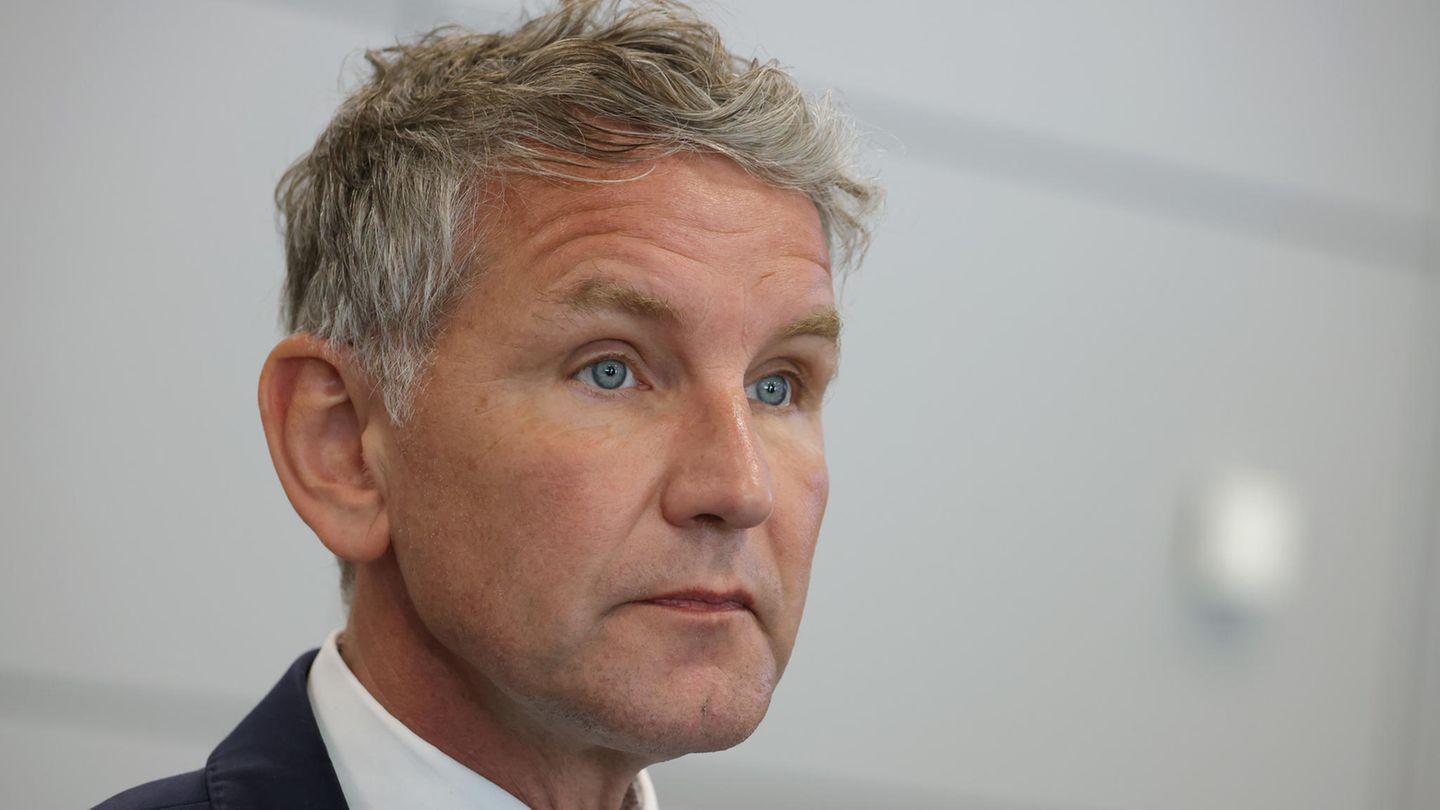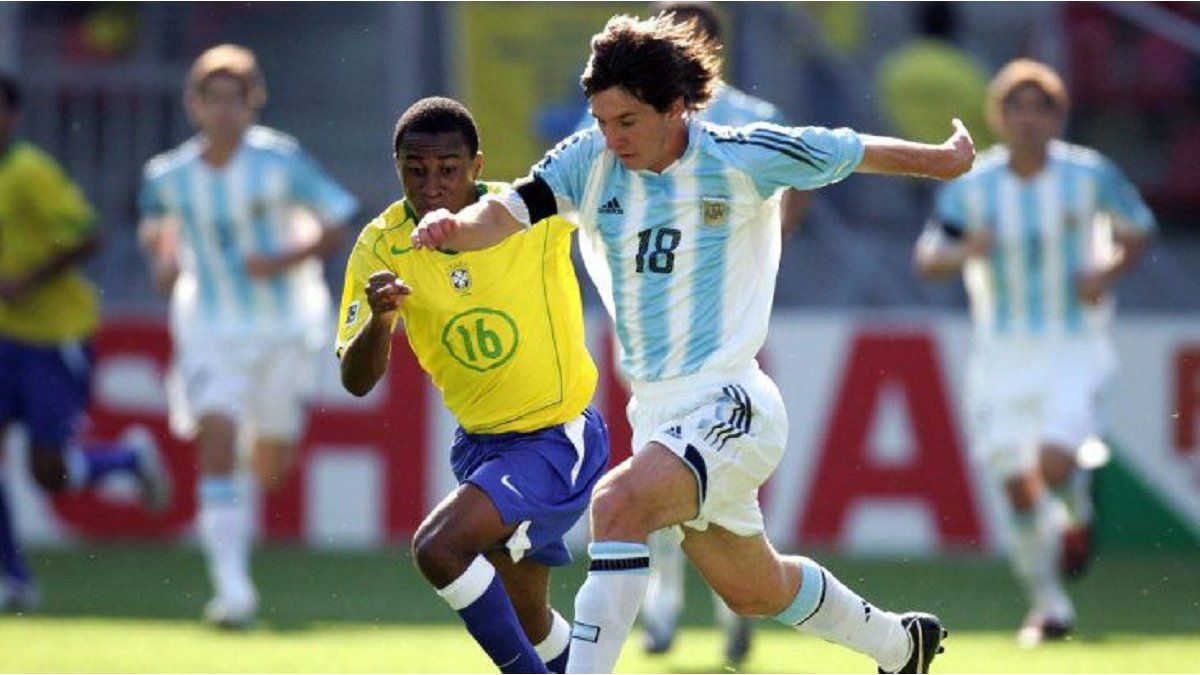Because Björn Höcke shouted an SA slogan at a rally, the Thuringian AfD leader has to pay a fine. Before the decision in Halle, he styled himself as the political persecutor of a Kafkaesque justice system.
It is 7:01 p.m. in the Halle Justice Center when the 5th Large Criminal Chamber of the Regional Court announces its decision on Björn Uwe Höcke from Bornhagen in Thuringia. He should pay 100 daily rates of 130 euros each and bear the costs of the procedure. “The court has to listen to everything,” says Jan Stengel, the presiding judge. “But you don’t have to believe everything.”
Höcke seems visibly touched. He stares fixedly at the judge, his face flushed. After half a dozen investigations into sedition and other crimes, he, the chairman of the Thuringian AfD and Germany’s best-known right-wing extremist, was convicted of “using the symbols of unconstitutional and terrorist organizations.” In his case, this identifier is a half-sentence made up of three words. Höcke shouted “Everything for Germany” at a rally in Merseburg in May 2021.
“Everything for Germany”: These three words were exactly engraved on the service dagger of every SA man. And exactly these three words were written in huge letters in Nuremberg’s Luitpoldhalle in 1934, where Adolf Hitler celebrated his NSDAP party rally. The pictures of this were shown in the courtroom.
The verdict is not only the end of an unusual trial, but also an unusual fourth day of proceedings – which is primarily due to the defendant being unusual in every respect.
Höcke’s speech in Gera
The trial day begins promptly at 9 a.m. on Tuesday morning. Outside, in front of the justice center, a large group of people is standing, as was the case at the start of the trial almost a month ago, to demonstrate against the defendant and the associated party. Inside, in the courtroom, the rows of seats are almost completely full in anticipation of the plea and verdict. As always, Höcke is wearing a dark blue suit, this time with a sky blue tie. As usual, he seems quite tense. He has stated often enough in his speeches, on social networks and in rare interviews that he has seen himself as a victim of an overreaching justice system for years.
After the opening of the hearing, Judge Stengel announces the decision on the most recently submitted requests for evidence. The chamber has approved what is probably the most important request from the public prosecutor’s office: the recording of a speech by Höcke, which he gave at an AfD event in December 2023, should be played – even though it is part of a separate indictment by the public prosecutor’s office.
In the video projected on the wall, the Thuringian AfD leader can be seen comparing immigration to a burst pipe. In this picture, the gushing water that floods everything is obviously intended to be a stream of unwanted migrants. What is needed here is a “blue plumber,” says Höcke, i.e. the AfD, because only they can dry out the German house “very quickly.” Otherwise, everything will soon look like it does in Suhl, where the Thuringian reception center is located and women are harassed or even groped.
Höcke talks about the “right of blood” and how Germany is being robbed of its identity. “Of course I would never talk about a major population change because then the Federal Office for the Protection of the Constitution would be watching me,” he says and laughs. But: “We are under observation by certain powers because there is a lot to be gained from us.” While Höcke in Gera says all this, Höcke’s face in Halle turns red. He knows what’s coming in the video: He addresses the trial that was still pending at the time and repeats what he shouted at the end of a rally in Halle in May 2021: “Everything for our homeland, everything for Saxony-Anhalt, everything for… ”
He lets the audience shout the last word – “Germany”.
The witness who worked with Kubitschek
This shows everything the public prosecutor needs. But now it’s the defense’s turn. As she puts it, she requests that one of the most knowledgeable experts on political symbolism ever be heard. And the court actually allows him to be a witness. This brings the appearance of Karlheinz Weißmann, a retired history teacher from Göttingen who once founded the Institute for State Politics with Götz Kubitschek.
Kubitschek? Exactly, that’s probably Höcke’s most important source of ideas. Until its dissolution a few days ago, the institute was considered an intellectual stronghold of the so-called New Right – and the AfD. Höcke was often a guest here, as was federal chairwoman Ailce Weidel and, most recently, the EU’s leading candidate Maximilian Krah. Weißmann withdrew from the institute years ago. But he continues to write for “Junge Freiheit” and has been working for a foundation close to the AfD for years. Now he should free Höcke, whom he says he only met once as a fellow teacher, from suspicion of the SA slogans.
Weissmann does what the defense asks him to do. He lectures about the fact that the saying “Everything for Germany” was invented by Ludwig I, the King of Bavaria, that it was used in the Weimar Republic by nationalists, but also by social democrats and, after 1945, even briefly by the SED. Only the SA hardly used the sentence, apart from the dagger. But the gesture of the knowledgeable is put into perspective when the presiding judge shows the witnesses the Nazi magazine “Der SA-Führer”, in which “Everything for Germany” is described as the “high and holy law of the SA.” Does he know the quote? ? No, answers Weißmann. He has never heard of it, asks Stengel. “So in that context, no.”
The strategy of defense
Either way, the defense strategy is sufficiently clear: Firstly, “Everything for Germany” was not an SA slogan, but rather just the Nazis’ appropriation of a common saying. The objective facts are therefore not present. And even if the court were to see this differently, Höcke would not have acted intentionally because he could not have known anything about it.
Prosecutor Benedikt Bernzen argues completely differently in his closing argument. As the speech in Gera in December 2023 shows, Höcke “dealt more than intensively with the language of National Socialism and adopted it as his own,” he says. He deliberately uses historical terms such as “revolkung” or “act elite” in order to continually push the boundaries of what can be said. “The defendant’s apparently well-founded vocabulary indicates knowledge of the perpetrator,” says Bernzen. Therefore, a prison sentence of 6 months, which should be suspended for two years, is the appropriate sentence. 10,000 euros should go to a Nazi memorial, a democracy promotion project or a dropout project for right-wing radicals.
Then it’s the turn of the three defense attorneys who, with as much time as they have to, give three arguments, one after the other. It is a matter of “criminalization of language” and a “media hunt,” says lawyer Ralf Hornemann. His colleague Philip Müller misses the motif in a “spontaneous speech” at a “completely insignificant event.” Lawyer Ulrich Vosgerau, who took part in the ominous meeting of politicians and right-wing extremists in Potsdam a few months ago, is particularly fundamental. He questions the nature of the crime as a whole. The legal norm, he says, is constitutionally “highly problematic.” And if his client were to be convicted, then “it would backfire.” Because: “Then I would of course take it up to the Federal Constitutional Court and the European Court of Human Rights.”
Before the verdict on banned SA slogans: This is how “friendly” Björn Höcke is received in Thuringia
01:43 minutes
Björn Höcke’s sacrificial speech
Finally the defendant sits up and speaks. And talks. And talks. Everything that has built up in Björn Höcke has to come out. The frustration with the public prosecutor (“You spoke in the diction of a political activist”), with the “distorted image of the established media” and with this unreasonable expectation of being in court. “Am I not human?” calls he. “The media treats me like I’m not human.” It’s been like this for eleven years now. His parliamentary immunity was lifted eight times because of opinion crimes, and two more trials are still pending. “I really have the feeling of being a politically persecuted person.”
Anyone who knows Höcke also knows his constant, often loud-sounding complaint about being demonized. He also repeats this complaint in Halle: “This way of being measured here, which presupposes the opposite of what I am, concerns me, concerns me deeply.”
He, Höcke: He is the victim here. Even more: He is Josef K. from “The Trial”. The politician, who drove up in his company limousine, compares himself to the tragic protagonist of Franz Kafka’s famous novel, “who is picked up one morning, completely innocent, and then convicted and executed.” At some point the presiding judge interrupts the defendant. “Mr. Höcke, to the point, no election speech!” Stengel admonishes him. But Höcke continues to talk for a while.
“I am completely innocent!”
The statement “Everything for Germany,” he says, was made spontaneously and without any knowledge that it had anything to do with the SA. “The Nazis also said hello. Do we want to ban the German language?” Höcke’s voice now gives his voice an almost desperate tone. “I have nothing to do with dictatorship,” he says. “Believe me, I didn’t know, I’m completely innocent, I have a completely clear conscience and I’m asking for an acquittal!”
His wish is not fulfilled. The court, says the presiding judge, came to the conclusion that he, Höcke, knew what he said on that May day three years ago in Merseburg. This may have happened spontaneously, according to the motto “Let’s see how far I can fight”. But this, says Stengel, doesn’t change the criminal liability: “Freedom of expression is being heavily used as a cover.”
Finally, the judge turns to the defense again. Of course, he says, an appeal can now be filed within a week; that is the defendant’s right. “But the threat of legal action doesn’t appeal to us,” he continues. “We don’t give a damn.”
Source: Stern
I have been working in the news industry for over 6 years, first as a reporter and now as an editor. I have covered politics extensively, and my work has appeared in major newspapers and online news outlets around the world. In addition to my writing, I also contribute regularly to 24 Hours World.




